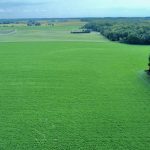The nature of scours in young calves makes it easy to collect a stool sample, and veterinarian Dr. Lisa Freeze advises cow-calf producers to do just that before providing treatment.
There are many different causes of calf scours and “there’s absolutely no way that you can look at a calf, or your vet can look at a calf, or look at the manure, and say exactly what is causing that diarrhea,” she said.
Bacteria is probably the most common cause, in which case antibiotics might be effective. However, scours can also be caused by parasites and viruses, so antibiotics would not address the illness.
Read Also

Forecast leans toward cooling trend
July saw below average temperatures, August came in with near to slightly above average temperatures and September built on this warming trend with well above average temperatures for the month.
“Sometimes the age that your calf gets sick will give you an idea of what bugs might be involved, but oftentimes when one bug is affecting a calf, some of the other bugs can kind of take advantage of that calf’s immune system being occupied with another problem and they can also cause secondary problems at the same time,” Freeze said during a recent webinar organized by the Beef Cattle Research Council.
There are two ways to figure out the cause of scours: get a manure sample tested or do a post-mortem on a calf that has died of the illness.
Obviously the former is preferable.
Fresher is better when collecting a sample. It should be put in a clean container and refrigerated until it can be given to a veterinarian for testing.
Freeze said collecting the sample before providing antibiotics is important. Otherwise, the test might provide a false reading and the recommended treatment might then be ineffective.
Tests can reveal the cause of the scours, indicating what vaccine for prevention or antibiotic for treatment would be best.
“That’s a really valuable piece of information that your vet can get from doing a … simple fecal sample,” Freeze said.















